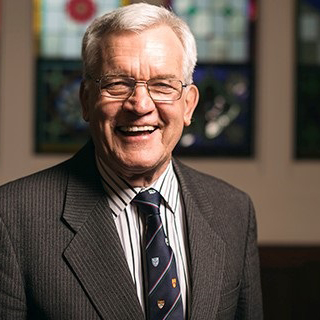Ian Diamond
 Ian Diamond
Ian Diamond
2020 UNE Alumni Community Award Winner
Retired minister Ian Diamond has always regarded his as a broad church that welcomes and supports all-comers. From his traditional parish work to walking beside prisoners, perpetrators of domestic abuse and drug offenders, it has singled him out as a religious maverick.
"Ministry, to me, means mixing with and guiding people across the spectrum of society," Ian says. "That's what Jesus did; he roamed around and spoke to everybody. Sometimes I have found the traditions and expectations of the formal church community very difficult. The moments in life when I have been free of those boundaries I have really flown."
In many ways, Ian believes that his UNE studies - a Bachelor of Arts degree in the 1960s - and the college life that accompanied it, prepared him well for the philosophical and practical challenges that followed. "I had an inkling during my final year of high school that maybe there was a calling to enter the ministry, and while I could have attended university in Sydney like many of my peers, and felt a certain sense of entitlement, I really needed to find myself away from family and friends," Ian says.
"My time in Armidale really kicked me off. UNE only had about 1000 students in four faculties at the time and, looking back, it was one of the best things I could have done. I had to start from scratch building relationships and making friends with totally different people, which proved good preparation for the ministry."
Upon graduation, Ian completed theological studies at the University of Sydney, and worked in a small parish at Lake Cargelligo before being ordained. Roles as a school chaplain and then minister at Ingleburn ensued, until Ian says he had an epiphany in his 30s. "I had never had to struggle or wonder where the next pay cheque would come from," he says. "So I took leave for a while and worked as a probation and parole officer to gain a different perspective on community life. Correctional services at that time had a number of ex-nuns, priests and pastors because of the compassion needed to help people who had ended up on the wrong side of the tracks."
Throughout his varied career, Ian enjoyed further parish appointments at Bowral, Broken Hill and Dubbo. He was a community support person for the Odyssey House drug rehabilitation program in Sydney and led an anger management program for domestic abuse offenders in Dubbo, and served on either side of the criminal justice fence, as a police chaplain (for 27 years) and a chaplain (for nine years) at the Berrima Correctional Facility.
"Many of the people in jail saw themselves as having been written off," Ian says. "They had seriously offended, but commonly spoke of upbringings that were completely dysfunctional and characterised by violence. I always saw them as human beings, born with wonderful potential and opportunities, who had simply made mistakes. I would never write them off.”
"I could see their restlessness to make amends, and then they would look to me for help with that. It gave me such a kick to play a very small, but perhaps to them significant part in their journey towards healing. It wasn't altogether different to my ministry; we are all on a journey towards wholeness and healing, whether we realise it or not."
After holding down police chaplaincy roles at Bowral, Broken Hill, Dubbo, Queanbeyan and the NSW Police Academy at Goulburn, Ian saw parallels, too, between police chaplaincy and his parole officer roles. "Both involved working with people and their families during very intense times," he says. "I got to appreciate that police are often under incredible stress and strain as well, and advocating for them was not unlike advocating for offenders in court."
Colleagues highlight that Ian has rarely "sat in a comfortable pew" and routinely went above and beyond his remit as a church minister. Even in retirement he has continued working with recruits at the police academy and, as recently as last January, served as a disaster chaplain during the bushfire crisis on the NSW South Coast.
"Maybe all the experience I have gleaned over the years is finally bearing fruit," he says. "But it will never finish. I am drawn to people in need and those who feel excluded, to try to find ways to change that in their perceptions of themselves but also to change the perceptions held by others. We are who we are and human beings change over time. Ultimately, we are united as the whole of creation. We sometimes lose sight of that."
For his considerable contributions over many years, Ian has been named a UNE Community Award winner for 2020.

